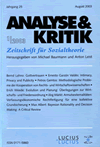Suchergebnisse
"Marco Faillo"
Titel: Contractarian Compliance and the 'Sense of Justice': A Behavioral Conformity Model and Its Experimental Support
Autor: Lorenzo Sacconi / Marco Faillo / Stefania Ottone
Seite: 273-310
Abstract: The social contract approach to the study if institutions aims at providing a solution to the problem of compliance with rational agreements in situations characterized by a conflict between individual rationality and social optimality. After a short discussion of some attempts to deal with this problem from a rational choice perspective, we focus on John Rawls's idea of 'sense of justice' and its application to the explanation of the stability of a well-ordered society. We show how the relevant features of Rawls's theory can be captured by a behavioral game theory model of beliefs-dependent dispositions to comply, and we present the results of two experimental studies that provide support to the theory.
Titel: Comment on Lorenzo Sacconi, Marco Faillo and Stefania Ottone: Contractarian Compliance, Welfarist Justice, and Conformist Utility
Autor: David Copp
Seite: 311-323
Abstract: This comment addresses two issues that arise in Sacconi/Faillo/Ottone's essay. The first is the problem of compliance as it arises in social contract theory. The second is the problem of avoiding an incoherence that arises in the formulation of welfarist principles of distributive justice if these principles are taken to be concerned with the distribution of welfare without restriction. Sacconi, Faillo, and Ottone define an interesting class of principles that govern only the distribution of 'material utility', which they distinguish from 'conformist utility'. Sacconi, Faillo, and Ottone are primarily concerned, however, to argue that there is a need to revise 'the utility maximization model of a rational economic man'. I discuss this claim briefly, in concluding the paper.
Titel: Distributive Justice in the Lab: Testing the Binding Role of Agreement
Autor: Laura Marcon, Pedro Francés-Gómez, and Marco Faillo
Seite: 107-135
Lorenzo Sacconi and his coauthors have put forward the hypothesis that impartial agreements on distributive rules may generate a conditional preference for conformity. The observable effect of this preference would be compliance with fair distributive rules chosen behind a veil of ignorance, even in the absence of external coercion. This paper uses a Dictator Game with production and taking option to compare two ways in which the device of the veil of ignorance may be thought to generate a motivation for, and compliance with a fair distributive rule: individually—as a thought experiment that should work as a moral cue—and collectively—as an actual process of agreement among subjects. The main result is that actual agreement proves to be necessary for agents to be led towards a fair distributive principle and to generate a significant amount of compliance in absence of external authority. This conclusion vindicates the role of actual agreements in generating motivational power in correspondence with fair distributive rules.

Work and Cooperation
2011 (33) Heft 1
Editorial
Both in social theories with the aim of looking into the creative core of society as well as in everyday politics, two intuitions often supplement each other. The first intuition, empirico-analytical, views common organization of work and production as being the very aim of society, and other parts of society being explicable from this. A second intuition, ethical or moral, holds the sphere of work to be the central site for diagnoses of a society's inherent justice. Both intuitions not only con...